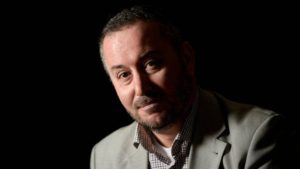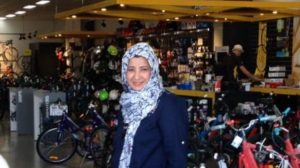Ramadan gaining acceptance in Australia
Nial Aykan rushes into the interview room out of breath. Having just climbed two flights of stairs, the head of the Islamic Council of Victoria (ICV) is conscious of punctuality. He excuses himself and rushes into the ICV mosque for 2.50pm prayer.
The Turkish-born Australian returns 10 minutes later relaxed for our 3pm interview.
Ramadan is a time for self-discipline and being on your best behaviour, Mr Aykan explains.
“I call it spiritual gym work,” he says. “It’s like going to one month’s training, so you can be a better person for the coming 11 months.”
 So when he hears of crimes that are committed in the name of Islam, particularly during Ramadan, he says he feels bewildered and deflated.
So when he hears of crimes that are committed in the name of Islam, particularly during Ramadan, he says he feels bewildered and deflated.
He is referring to the recent Manchester Arena suicide bombing that claimed the lives of 22 people and left 116 wounded. Closer to home, in Melbourne, a Somalian-born refugee murdered one man, wounded three police officers and took a woman hostage, all in the name of Allah.
“These crimes are happening and there’s no answer. You’re stunned and it’s supposedly done in the name of your faith,” he says. “Well, these are the most misguided people, you know. It’s just unbelievable.”
For newly arrived Muslims settling into life in an adopted country, not only are such terrorist attacks unsettling, they amplify cultural differences.
“When we get out of our homes after an incident like that, I’m afraid to come out of my home,” says Pakistani migrant Aleena Saeed. “And the shame we feel if somebody is a Muslim and he has done something like that, when we hear the news, our blood stops running into our veins.”
Notwithstanding these attacks, Turkish Cypriot Omar Aktunc, who arrived in Australia more than 40 years ago, says along with the growth in the Muslim population, there is greater awareness and acceptance of Islam and Ramadan.
“In 1976 we didn’t have that many Muslim families living in this country,” Mr Aktunc says. “When we were fasting during Ramadan, we didn’t tell anyone because we didn’t want anyone to look at us as if we were different.”
Today those fears have evaporated. People understand when you tell them you are fasting, that it is for Ramadan, he says. Even supermarkets have cottoned on.
“I walked into Coles yesterday and there was a table of thousands of date boxes,” the 47-year-old says. “I couldn’t believe it. I’ve never seen that many dates in one place at the one time, so everyone sort of knows that we’re going to be buying those things.”
During Ramadan, Muslims the world over forego food and drink for one month as a way of empathising with those who are less privileged. Traditionally, the nightly meal that breaks the fast, known as Iftar, begins with dates. This is the time that Muslims are encouraged to be generous and inclusive, sharing their food with others.
During the holy month, in particular, Mr Aykan says he reaches out to those in difficult circumstances.
“Every night for 30 days we have an open door Ifta for anybody who doesn’t have a family and a place to go,” he says.
Around 250 people gather each evening to break the fast, pray, and then feast.
“So what we are saying is, this is your home and it doesn’t cost you anything. Everything is provided,” Mr Aykan says. “Don’t feel unloved, don’t feel excluded and don’t feel like the other.”
Apart from the spiritual aims of Ramadan, he says, there is a social impact.
“There are a lot of things which are achieved in that social space which cannot be achieved outside of Ramadan,” Mr Aykan says. “I mean there’s no way I could gather 250 people every single night for 30 nights outside of Ramadan. They just won’t come, or they won’t come on time. Sorry. No. Call to prayer is 5.15. Be here. No excuse.”
 Muslims believe Ramadan, the ninth month in the Islamic calendar, was when the Qur’an began to be revealed to the Prophet Muhammad in the year 610 AD. It was through these revelations, occurring over a 23-year period, that Ramadan was declared a blessed month and fasting became obligatory.
Muslims believe Ramadan, the ninth month in the Islamic calendar, was when the Qur’an began to be revealed to the Prophet Muhammad in the year 610 AD. It was through these revelations, occurring over a 23-year period, that Ramadan was declared a blessed month and fasting became obligatory.
Mrs Saeed, who has been fasting from sunrise to sunset everyday since May 27, is preparing for her very first Australian Eid, a festival marking the end of the Muslim holy month.
The agriculturalist, who recently moved to Point Cook in Melbourne’s outer west, likens the celebration to Christmas on the Christian calendar.
“At Christmas you take gifts, visit people, you have holidays. We celebrate Eids, visit people, take gifts,” she says. “You take gifts for the children. We give them money.”
Even though Mr Aktunc arrived in Australia at the age of six, he still has fond memories of Eid in his birth town of Nicosia in Cyprus.
“We call it Bayram in the Turkish language. It’s very similar to Christmas time” says the 47 year old. “We’d all have to have a new outfit and we’d go to our grandparent’s house and kiss their hand, and my grandparents would give us money, like 5 dollars, 10 dollars.”
While Mrs Saeed refers to this money as Eidi, Mr Aktunc says in the Middle East it’s called harçlık (pronounced: Har-ghee-et).
“I always make sure that I get 100 dollars worth of five dollar notes and have it in my pocket,” he says. “Because you always have to give the kids who come and kiss your hand money, because we’re celebrating.”
According to Indonesian migrant Nelly Sari, who landed in Australia six months ago, this money, which she calls Thr, is not just for children. Some employers give what’s called an Idul Fitri (Indonesian for Eid) allowance, which Mrs Sari describes as the equivalent of a Christmas bonus.
“If you are Muslim, at Ramadan they will give you this money,” she says. “If you are Christian, before Christmas the employers give you this Thr.”
Experiencing her first winter Ramadan, Mrs Sari is surprised by the difference in daylight hours between the Australian summer and winter. This means dramatic changes in sunset prayer times, which she says have gradually moved from nine o’clock in summer to five in winter.
“In my country if they change, it’s just by five or 10 minutes. That’s the hard thing,” Mrs Sari says.
But Subekti Riptodiharjo, also Indonesian, sees the bright side of shorter Ramadan days.
“It’s three hours less than in Indonesia,” she says. “In Indonesia we usually have about 15 hours fasting, but here only 11 hours.
Mrs Riptodiharjo met her Australian husband, Dion, in Bali. The pair fell in love, married and lives in Noble Park. Given her husband is not Muslim and therefore not fasting, she describes her first Ramadan in Australia as lonely.
“In Indonesia … after every night we pray,” she says. “We call it Tarawih and we go to the mosque. Everyone praying there, so I feel that I have friends, but here I do it by myself, so I really miss it.”
Mr Actunc, who lives in North Dandenong, says Ramadan is a month that promotes togetherness.
“We believe that it’s not really nice if you live on your own and break fast by yourself,” he says. “We believe that it’s good to break fast in company.”
Unlike Christmas, which always falls on December 25, the date for Bayram, Eid ul Fitr or Idul Fitri changes every year.
While the western or Christian calendar is based on a solar year, the Islamic calendar follows lunar months. Given it takes the moon 29.53 days from one new moon to the next, the end of a lunar year falls 11 days short of the standard 365-day western calendar.
Traditionally, Muslims rely on visual cues to determine the start and finish of the holy month. As the moon comes to the end of a cycle, it becomes thinner, until a slight crescent is visible. The following day, coinciding with the new moon, marks the beginning of Ramadan.
One of the biggest changes Mr Aykan has seen across the past four decades in this country is that many non-Muslims are seeking to share in the Ramadan experience.
Importantly, in recent years the biggest sporting body in Australia has embraced Muslims like never before. Mr Aykan says the AFL, along with other large organisations and politicians are now reaching out to the Muslim community and hosting their own Ramadan dinners.
Victorian Premier Daniel Andrews and the Governor of Victoria, the Honourable Linda Dessau AM, are among them.
“The Premier is, for the third time, hosting an Iftar,” he says. “You’ve got the first Jewish governor ever, amazing woman and she’s having Muslims over for dinner.”
He is buoyed by these gestures, which he says go a long way to contributing to social cohesion, describing them as “multiculturalism at its best”.
It’s 3.30pm.
The interview is over.
Mr Aykan has much to fit in before heading to the AFL’s annual Iftar.
But he has to arrive before 5.08pm to break fast.
No excuses.
Cesira Colleluori












